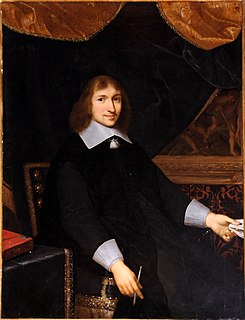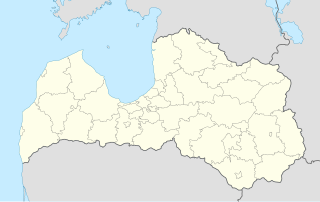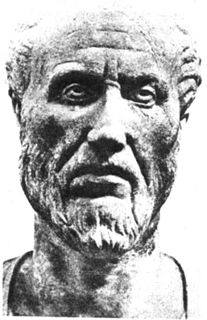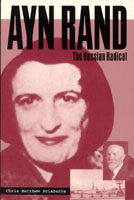Axiology is the philosophical study of value. It is either the collective term for ethics and aesthetics, philosophical fields that depend crucially on notions of worth, or the foundation for these fields, and thus similar to value theory and meta-ethics. The term was first used by Paul Lapie, in 1902, and Eduard von Hartmann, in 1908.

Nicolas Fouquet, marquis de Belle-Île, vicomte de Melun et Vaux was the Superintendent of Finances in France from 1653 until 1661 under King Louis XIV. He had a glittering career, and acquired enormous wealth. He fell out of favor, accused of peculation and lèse-majesté. The king had him imprisoned from 1661 until his death in 1680.

Phronema is a transliteration of the Greek word φρόνημα, which has the meanings of "mind", "spirit", "thought", "purpose", "will", and can have either a positive meaning or a bad sense.

In Eastern Orthodox theology, there is a distinction between the essence (ousia) and the energies (energeia) of God. It was first formulated by Gregory Palamas (1296–1359) as part of his defense of the Athonite monastic practice of hesychasmos against the charge of heresy brought by the humanist scholar and theologian Barlaam of Calabria.
Gnosiology, a term of 18th-century aesthetics, is "the philosophy of knowledge and cognition". In Soviet and post-Soviet philosophy, the word is often used as a synonym for epistemology. The term is currently used in regard to Eastern Christianity.

Vladimir Nikolayevich Lossky was an Eastern Orthodox theologian in exile from Russia. He emphasized theosis as the main principle of Eastern Orthodox Christianity.

Nikolay Onufriyevich Lossky, also known as N. O. Lossky, was a Russian philosopher, representative of Russian idealism, intuitionist epistemology, personalism, libertarianism, ethics and axiology. He gave his philosophical system the name intuitive-personalism. Born in Latvia, he spent his working life in St. Petersburg, New York, and Paris. He was the father of the influential Christian theologian Vladimir Lossky.

Krāslava is a town and the administrative centre of Krāslava Municipality, in the Latgale region of Latvia. The town lies on the Daugava, upstream and to the east of the city of Daugavpils.
Sobornost is a term coined by the early Slavophiles, Ivan Kireyevsky and Aleksey Khomyakov, to underline the need for co-operation between people, at the expense of individualism, on the basis that the opposing groups focus on what is common between them. Khomyakov believed the West was progressively losing its unity because it was embracing Aristotle and his defining individualism. Kireyevsky believed that Hegel and Aristotle represented the same ideal of unity.

Semyon Lyudvigovich Frank was a Russian philosopher. Born into a Jewish family, he became a Christian in 1912.
Cataphatic theology or kataphatic theology is theology that uses "positive" terminology to describe or refer to the divine – specifically, God – i.e. terminology that describes or refers to what the divine is believed to be, in contrast to the "negative" terminology used in apophatic theology to indicate what it is believed the divine is not.

De Coelesti Hierarchia is a Pseudo-Dionysian work on angelology, written in Greek and dated to ca. the 5th century CE; it exerted great influence on scholasticism and treats at great length the hierarchies of angels.

The Eleusa is a type of depiction of the Virgin Mary in icons in which the infant Jesus Christ is nestled against her cheek. In the Western church the type is often known as the Virgin of Tenderness.

The Catholic Church and the Eastern Orthodox Church have been in a state of official schism from one another since the East–West Schism of 1054. This schism was caused by historical and language differences, and the ensuing theological differences between the Western and Eastern churches.

Ayn Rand: The Russian Radical is a 1995 book by Chris Matthew Sciabarra tracing the intellectual roots of 20th-century Russian-American novelist and philosopher Ayn Rand and the philosophy she developed, Objectivism.

Nepsis is an important idea in Orthodox Christian theology. It means wakefulness or watchfulness and constitutes a condition of sobriety acquired following a period of catharsis.

20th century Eastern Orthodox theology has been dominated by neo-Palamism, the revival of St. Palamas and hesychasm. John Behr characterizes Orthodox theology as having been "reborn in the twentieth century." Norman Russell describes Orthodox theology as having been dominated by an "arid scholasticism" for several centuries after the fall of Constantinople. Russell describes the postwar re-engagement of modern Greek theologians with the Greek Fathers, which occurred with the help of diaspora theologians and Western patristic scholars. A significant component of this re-engagement with the Greek Fathers has been a rediscovery of Palamas by Greek theologians; Palamas had previously been given less attention than the other Fathers.

Ousia is an important philosophical and theological term, originally used in ancient Greek philosophy, then later in Christian theology. It was used by various ancient Greek philosophers, like Plato and Aristotle, as a primary designation for philosophical concepts of essence or substance. In contemporary philosophy, it is analogous to English concepts of being and ontic. In Christian theology, the concept of θεία ουσία is one of the most important doctrinal concepts, central to the development of trinitarian doctrine.
Olga Lossky is a contemporary French woman of letters or russian origin.








